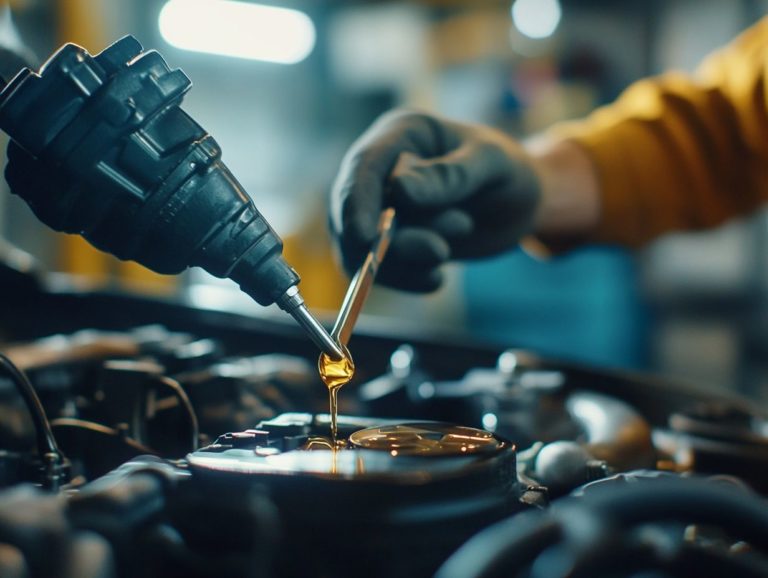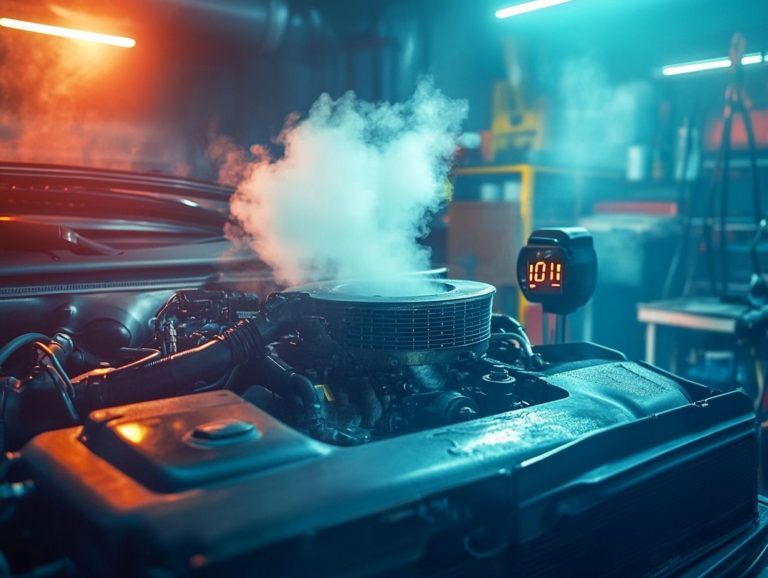How to Maintain Your Car’s Electrical System?
Your car s electrical system serves as the backbone of its functionality, powering everything from the headlights to the engine. Neglecting this crucial component can cause frustrating breakdowns and costly repairs. Don’t let this happen to you!
This guide explores the importance of maintaining your car s electrical system in peak condition, highlights common signs of electrical issues, and offers essential maintenance tips that are easy to follow.
Whether you re a DIY enthusiast or simply seeking to stay informed, this information will empower you to keep your ride running smoothly.
Contents
- Key Takeaways:
- The Importance of Maintaining Your Car’s Electrical System
- Signs of Electrical System Issues
- Regular Maintenance Tasks
- DIY Tips for Maintaining Your Car’s Electrical System
- When to Seek Professional Help
- Preventive Measures for Maintaining Your Car’s Electrical System
- Frequently Asked Questions
- What is the purpose of maintaining my car’s electrical system?
- What are some signs that my car’s electrical system needs maintenance?
- How often should I have my car’s electrical system checked?
- Can I maintain my car’s electrical system on my own?
- What are some tips for maintaining my car’s electrical system?
- Is it important to use high-quality parts for my car’s electrical system?
Key Takeaways:
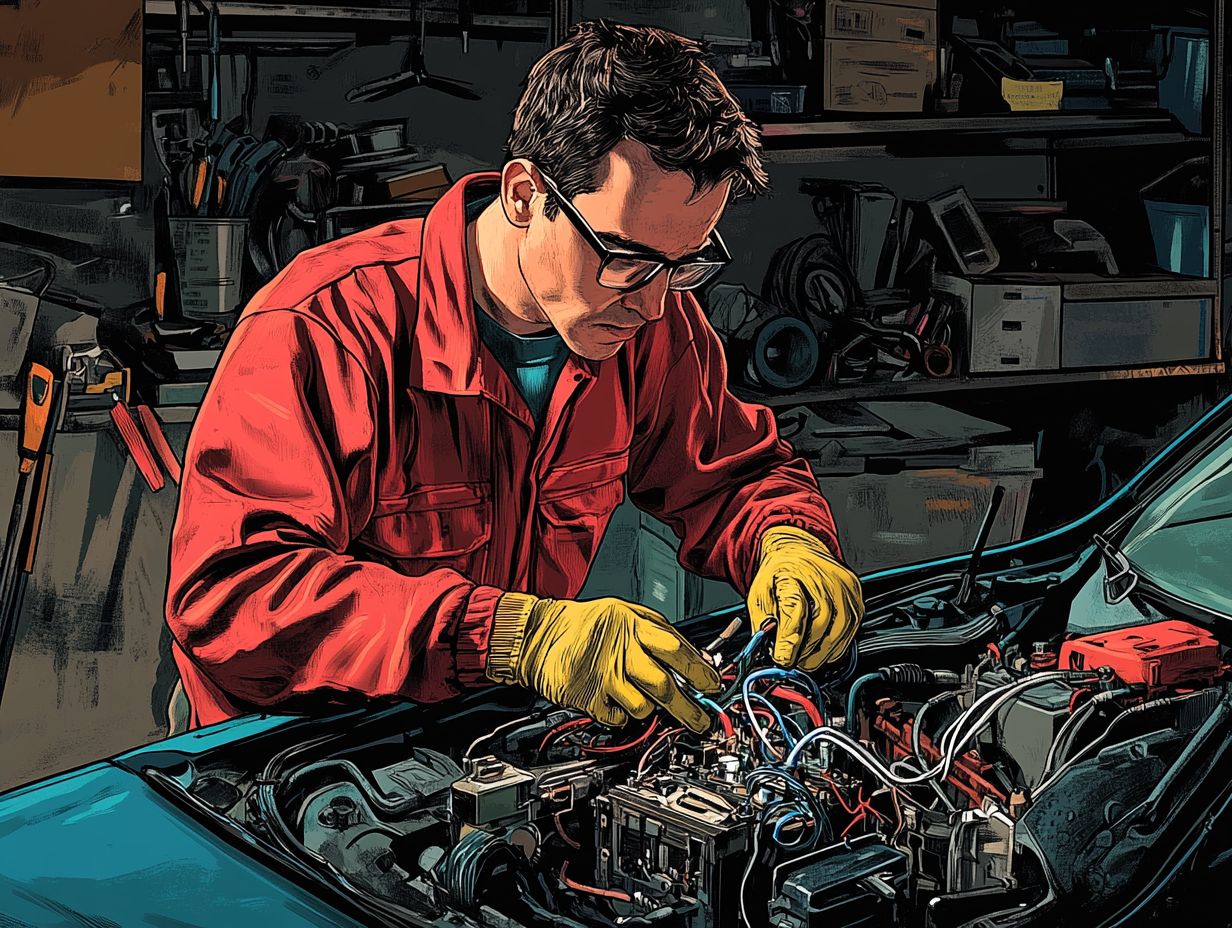
- Regular maintenance is crucial for your car’s electrical system to prevent issues and ensure smooth functioning.
- Look out for common signs of electrical system issues, such as dimming lights or difficulty starting the car, and take action to prevent further damage.
- Prevention is key follow simple DIY tips and seek professional help when needed to maintain your car’s electrical system and avoid future problems.
The Importance of Maintaining Your Car’s Electrical System
Maintaining your car’s electrical system is crucial for the seamless operation of essential components like the battery, starter, alternator, and power locks. A well-kept electrical system boosts your vehicle’s performance and guarantees safety and reliability on the road.
Schedule your inspections today to catch potential issues before they become costly headaches! By arranging regular inspections and check-ups, you can catch potential issues early, ultimately saving both time and money.
Ignoring the electrical system can lead to a host of problems, causing inconvenience and risks while driving. Understanding the fundamentals of your vehicle s electrical system and its key components is vital for you as a vehicle owner; it enables you to keep your car running smoothly and efficiently.
Why is it Important to Keep Your Car’s Electrical System in Good Condition?
Keeping your car’s electrical system in top-notch condition is essential for ensuring optimal performance, safety, and longevity.
Regular maintenance prevents pesky electrical issues that could leave you stranded or facing expensive repairs. By addressing minor problems early, you can boost your fuel efficiency, translating to more miles per gallon and savings at the pump.
Routine check-ups extend the lifespan of vital components like the battery, starter, and alternator, all critical for your vehicle s reliable operation.
These preventive services not only allow you to spot potential issues early but also enable timely fixes that can save you both time and money in the long run.
Signs of Electrical System Issues
Recognizing the signs of electrical system issues is essential for maintaining your vehicle’s health and preventing unexpected breakdowns. Symptoms like dimming lights, malfunctioning power locks, or windows, or having difficulty starting the engine are key indicators.
When these signs arise, inspect the battery cables, fuses, and other electrical components to pinpoint potential problems. Early detection can save you from costly repairs and ensure your vehicle runs safely.
Regular inspections can also help address issues related to corrosion, particularly around the battery connections, where you may need to use corrosion removal chemicals.
Common Symptoms to Watch Out For
Common symptoms of electrical system issues you might encounter include flickering dashboard lights, difficulty starting the engine, and power windows or locks that refuse to cooperate.
These signs can signal underlying problems stemming from a failing battery or a malfunctioning starter or alternator. For example, if you notice the headlights dimming when the engine is idling, it could mean the alternator is struggling to deliver enough power.
If your vehicle hesitates or emits clicking sounds when you try to start it, the starter might be the culprit. Address these symptoms promptly; delaying inspections can lead to more significant damage and expensive repairs.
A comprehensive check of the battery, starter, and alternator will help ensure your safety on the road and maintain your vehicle’s optimal performance.
Don’t wait for problems to arise take charge of your car s electrical system today!
Regular Maintenance Tasks
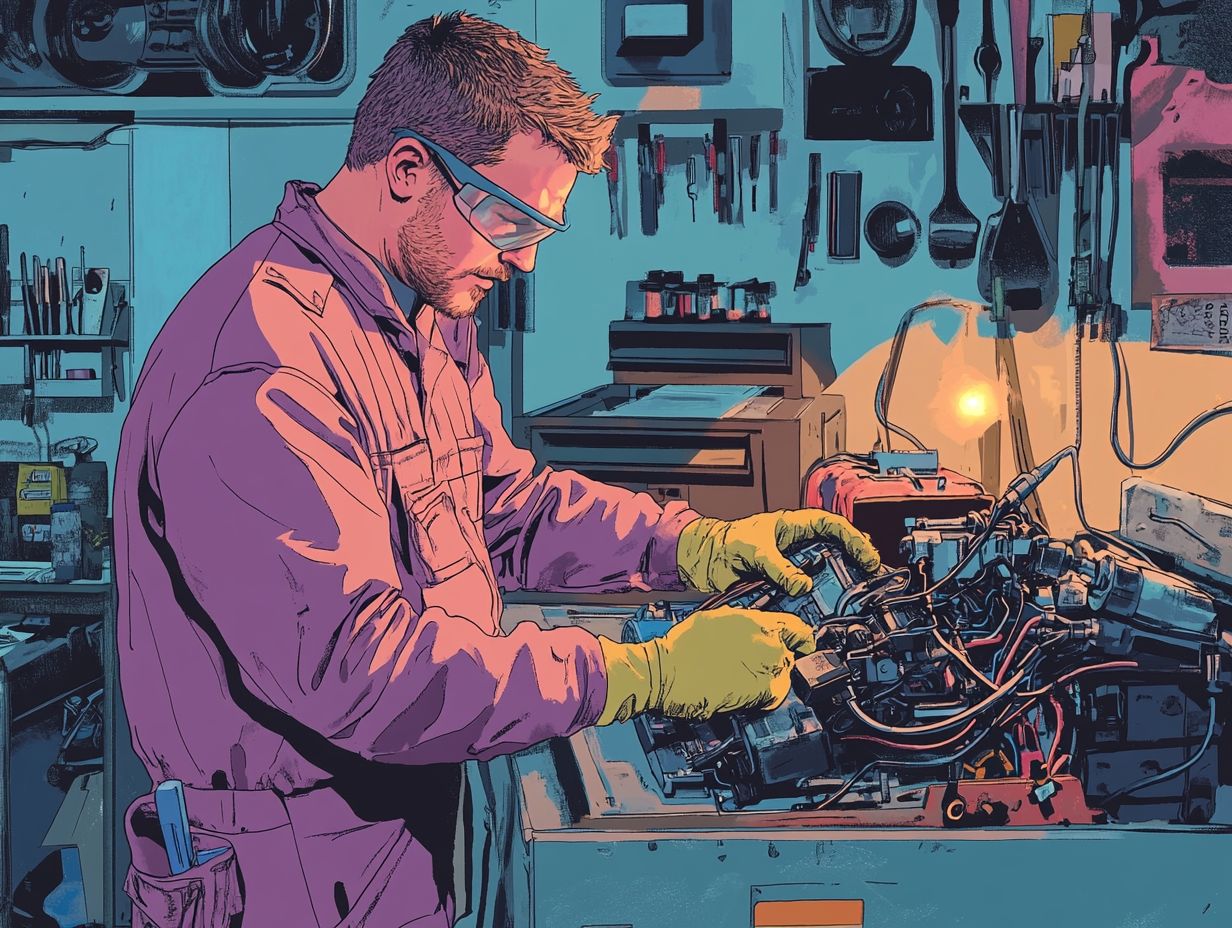
Implementing regular maintenance tasks is essential for ensuring your vehicle’s electrical system operates at its best and for preventing those unexpected breakdowns that can disrupt your day. Key tasks to keep in mind include:
- Regularly checking the battery
- Inspecting the battery cables
- Ensuring that all electrical components are in good condition
It’s wise to schedule routine inspections for the drive belt and other critical systems to catch any signs of wear and tear early. Knowing when to replace your battery is key for better performance.
Steps to Take to Keep Your Electrical System Running Smoothly
To ensure your vehicle’s electrical system operates seamlessly, start by regularly inspecting the battery cables and connections for any signs of corrosion. Taking just a few moments to keep these components clean and free from debris can save you from frustrating power outages later on.
Next, it’s essential to examine the fuses in your fuse box, as a blown fuse can disrupt critical systems such as lighting and ignition. Cleaning the connections at the battery terminals is also vital to maintain optimal energy flow. Testing the alternator with a multimeter, a tool that measures the voltage and current, shows if it’s charging the battery properly.
Understanding these basics allows you to perform essential checks confidently, ultimately enhancing both safety and reliability for your vehicle.
DIY Tips for Maintaining Your Car’s Electrical System
You don’t need to be a pro to maintain your car’s electrical system! There are many easy DIY tips you can follow.
Begin by inspecting the battery cables for any signs of wear and tear, and don t hesitate to apply a cleaner for removing corrosion when needed. Regularly checking for electrical issues like those pesky malfunctioning power windows or lights can save you a considerable amount on repairs.
By familiarizing yourself with the basics of automotive electrical systems, you ll be enabled to troubleshoot minor problems with confidence and ease.
Simple Tasks You Can Do Yourself
You can easily handle several straightforward tasks to maintain your car’s electrical system, such as regularly checking the battery and inspecting the drive belt. By dedicating a bit of time to understanding these processes, you can ensure your vehicle remains in optimal condition.
A thorough battery check involves inspecting for corrosion on the terminals and confirming that the connections are secure. All you need for this task is a simple wire brush to clean any buildup and a wrench for tightening.
Regarding inspecting the drive belt, this proactive measure can prevent significant issues later on. Look for cracks or fraying, and if it seems worn, replacing it is usually a breeze with just a few tools like a belt tensioner and a ratchet set.
By encouraging consistent monitoring and keeping a record of each completed task, you not only enhance the longevity of your vehicle but also gain a satisfying sense of accomplishment and knowledge about your ride.
When to Seek Professional Help
Recognizing the right moment to seek professional assistance is crucial for the longevity of your vehicle’s electrical system, especially when you encounter persistent signs of trouble or find yourself struggling to diagnose the issue.
If you notice flickering lights or a weak battery, don’t wait! Get help as soon as possible. Acting quickly can prevent larger issues down the line and ensure that your vehicle remains safe and dependable on the road.
Warning Signs That Indicate a Need for Professional Maintenance
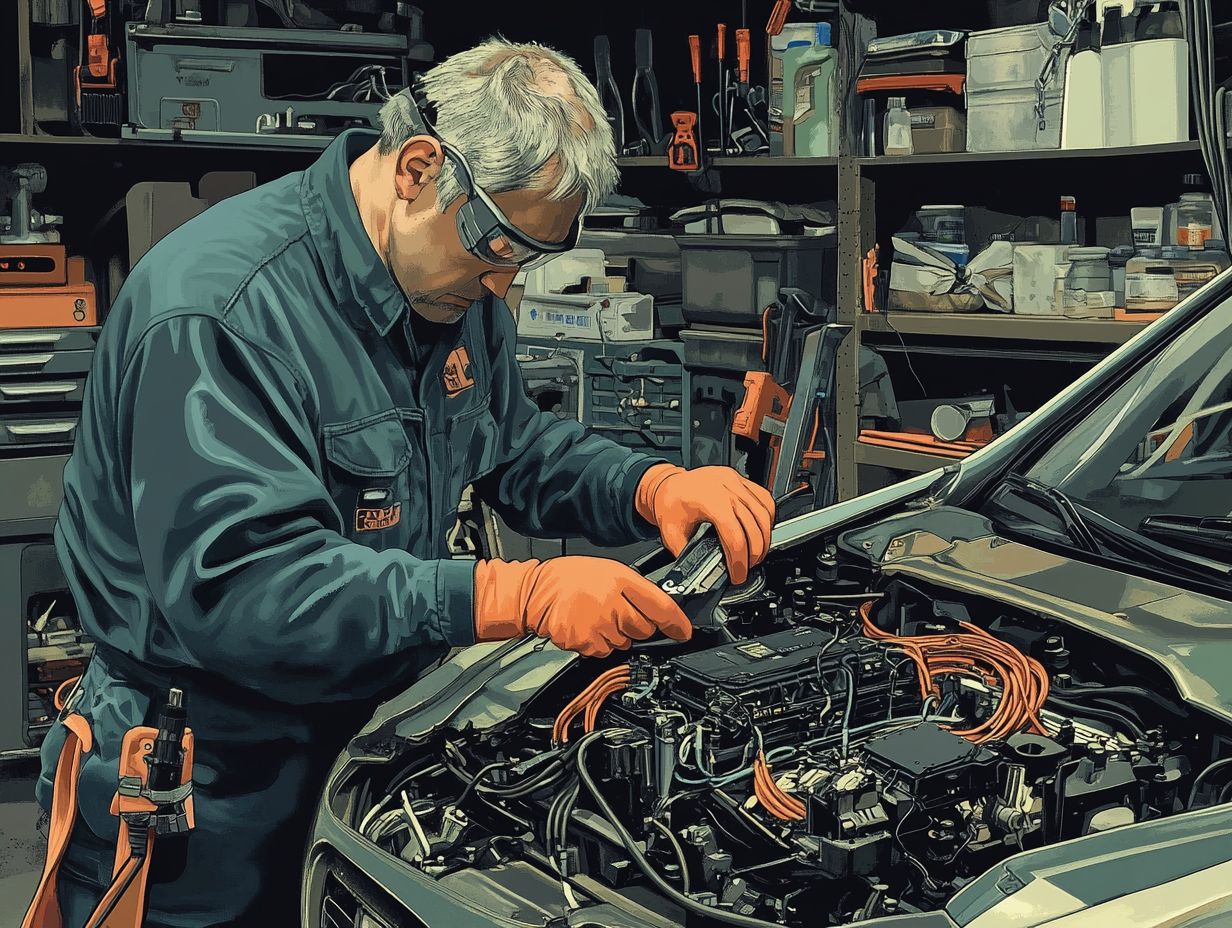
Don’t ignore warning signs that could lead to costly repairs! Look for persistent dashboard lights, unusual sounds, or electrical problems.
Warning signs that indicate you might need professional maintenance include persistent dashboard warning lights and unusual sounds when starting your vehicle.
If you notice strange vibrations while driving or a decline in fuel efficiency, these are red flags that shouldn t be ignored.
Fluid leaks beneath your vehicle also point to potential issues. Addressing these promptly is crucial; if left unchecked, they could escalate into more significant damage and costly repairs.
It s essential for you as a vehicle owner to meticulously document these warning signs and share them with an automotive technician.
This ensures a comprehensive evaluation of your vehicle’s overall condition, helping you prevent further complications down the road.
Preventive Measures for Maintaining Your Car’s Electrical System
To keep your car’s electrical system in top shape, implement preventive measures. This will help you avoid unexpected problems and enhance safety.
By regularly inspecting the battery and its connections, and utilizing corrosion removal chemicals, you can minimize the risk of electrical failures.
Adhering to recommended maintenance intervals is also important. Understanding your vehicle’s electrical system helps you spot early warning signs of trouble.
Tips for Avoiding Electrical System Issues in the Future
To prevent electrical system issues, consider establishing a routine of preventive maintenance services for your vehicle s electrical components. This proactive approach can significantly enhance the longevity and reliability of your vehicle s system.
Start by scheduling regular inspections where the battery, wiring, and fuses are examined with meticulous attention to detail.
Utilizing high-quality parts during repairs is crucial; this ensures better performance and minimizes wear over time.
Pay close attention to how your electrical systems are functioning. Dimming headlights or unusual dashboard warnings can serve as key indicators of potential failures.
By remaining proactive with these straightforward maintenance tasks, you can avert costly repairs down the line while enjoying a smoother, more dependable driving experience.
Frequently Asked Questions
What is the purpose of maintaining my car’s electrical system?
Maintaining your car’s electrical system is crucial for ensuring that all components function properly. For more information, refer to the basics of car electrical system maintenance, as it helps to prevent potential safety hazards and costly repairs in the future.
What are some signs that my car’s electrical system needs maintenance?

Common signs that indicate your car’s electrical system needs maintenance include dimming headlights, flickering interior lights, and difficulty starting the engine.
Unusual noises coming from the engine can also signal trouble.
How often should I have my car’s electrical system checked?
It is recommended to have your car’s electrical system checked at least once a year by a professional mechanic. However, if you notice any warning signs, it is best to have it checked immediately.
Can I maintain my car’s electrical system on my own?
While you can perform basic maintenance tasks such as checking and replacing fuses, it’s best to leave complex tasks to a qualified mechanic. This ensures the safety and proper functioning of your vehicle.
What are some tips for maintaining my car’s electrical system?
Regularly check your battery for corrosion and clean it if necessary. Keep your battery terminals tight and secure.
Make sure all lights, including headlights and turn signals, are in working condition and have your battery and charging system tested regularly.
Schedule a maintenance check today to ensure your vehicle stays reliable and safe on the road!
Is it important to use high-quality parts for my car’s electrical system?
Absolutely! Using high-quality parts for your car’s electrical system, which powers everything from your lights to your engine, is crucial.
Cheap or faulty parts can lead to malfunctions. These issues may even harm other vital components of your vehicle!





